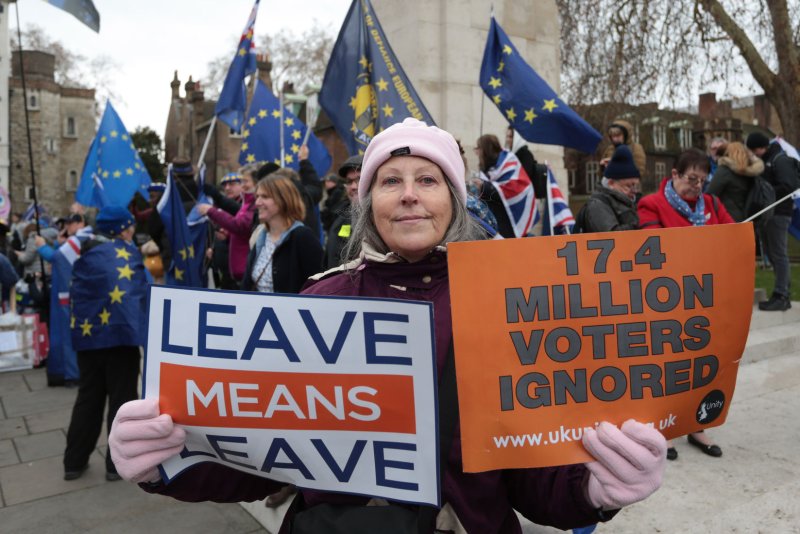Brexit protesters campaign outside Houses of Parliament in January 2019. File Photo by Hugo Philpott/UPI |
License Photo
March 5 (UPI) -- A crucial parliamentary vote on Brexit is one week away and, for the first time in months, British Prime Minister Theresa May could be close to getting a compromise from legislators.
Although May still needs to clear key hurdles to pass a deal and avoid plunging Great Britain into a chaotic no-deal departure from the European Union on March 29, Foreign Secretary Jeremy Hunt said he's seeing "positive" signals from Members of Parliament.
"They are beginning to realize that we can get a majority in Parliament because they are seeing the signals coming from the people who voted against the deal before who are saying, crucially, that they are prepared to be reasonable about how we get to that position that we can't legally be trapped in the backstop," Hunt said on BBC Radio 4 Today.
It starts with Attorney General Geoffrey Cox and Brexit Secretary Stephen Barclay, who traveled to Brussels to negotiate with the European Union on legally binding changes to the so-called Irish backstop.
The backstop would maintain the British customs union "unless or until" a future trade deal or other arrangements make checks on the border unnecessary.
May's Conservative Party will monitor the negotiations in Brussels for anything that falls short of its Brexit demands. They are concerned that the backstop sacrifices Britain's autonomy, a major sticking point for the Brexit referendum's success in 2016.
EU officials are reluctant to make concessions but they also want a deal to pass Parliament rather than have a no-deal Brexit.
If the March 12 deal fails in Parliament, there could be a vote on a no-deal Brexit or even a vote to consider a second referendum that would go to voters. Parliament could also vote to extend the exit deadline so they have more time to work things out.
Hunt said he hopes that doesn't happen.
"What I am working for, alongside all members of parliament, is to get that deal through and I think we can," Hunt said. "I have always said whatever happens in negotiations, we are a strong country and will find a way to prosper. But no deal would cause huge disruption. No one in the cabinet wants no deal. What we want is a deal."
The threat of Brexit, especially if there's no deal, could hurt the British economy.
An official with BMW said the company may stop producing Mini cars at its Cowley plant, putting 4,500 jobs at risk, if there is a no-deal Brexit.
Last month, Nissan Motor Company confirmed it will move production of the new X-Trail SUV to Japan. It was originally planned for a plant in Sunderland.
"While we have taken this decision for business reasons, the continued uncertainty around the UK's future relationship with the EU is not helping companies like ours to plan for the future," Nissan Europe Chairman Gianluca de Ficchy said.
Toyota and Vauxhall have also threatened to leave the country if there's a no-deal Brexit.















